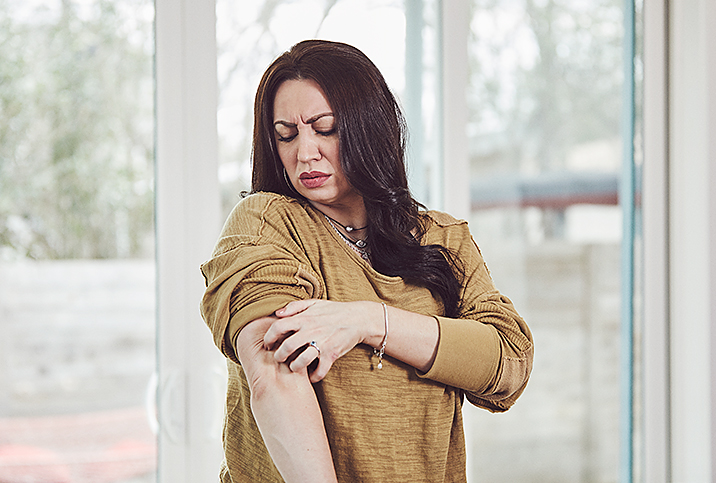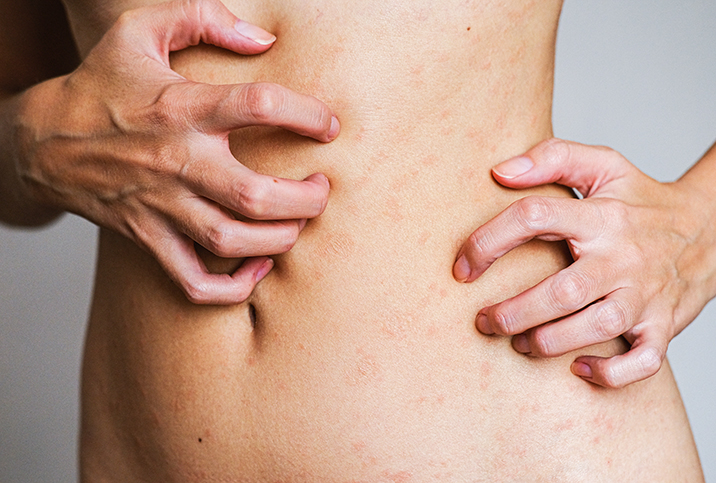Don't Let Sensitive Skin Affect Your Sexual Health

Itchy. Flaky. Bumpy. Blotchy. Flush. Burning. Scaly.
Think of them as the seven pillars of sensitive skin wisdom. Most people have experienced one or more of these symptoms at one time or another, but some have skin more prone to acting up than others.
"With as many as 45 percent of Americans reporting sensitive skin, it is important to consider how many commonly used products contain allergens or irritants that might cause skin irritation and discomfort," said Elizabeth Mullans, M.D., a board-certified dermatologist and founder of Uptown Dermatology in Houston.
These products include soaps, moisturizers, cosmetics, cleaning agents and even bodily fluids such as sweat and urine.
According to London dermatologist Daniel Glass, M.D., skin reactions are broken down into two groups: irritant contact dermatitis and contact allergic dermatitis.
"There are several medical conditions that can predispose skin to be more sensitive," Glass explained. "Probably the most common is irritant contact dermatitis. This is inflammation of the skin in response to an externally applied agent, not due to allergy."
In contrast, contact allergic dermatitis usually "presents as eczema or dermatitis caused by contact with a substance you have become allergic to [the allergen]," he added.
Typically, the reaction occurs hours or days after contact with the offending substance. Examples of contact allergic dermatitis include an allergy to nickel, which can cause a response to some jewelry and accessories like belt buckles; a chemical called PPD (p-Phenylenediamine) found in hair dyes; preservatives in cosmetics; acrylates used in nail products; and chemicals used in the manufacture of rubber gloves, to name a few.
Distinguishing between contact allergic dermatitis and irritant contact dermatitis can be challenging, Glass said, and may require patch testing conducted by a dermatologist who can also provide advice on avoiding substances that may be causing reactions.
"Occasionally, if the diagnosis is not clear, then a skin biopsy can be helpful," he said.
When problems are skin deep
Skin sensitivity appears in many different forms, and every person who reports having sensitive skin likely means something different. The condition usually arises in one of the following six ways:
- Dry skin can be caused by cold or dry weather, sun damage, harsh soaps and detergents, overbathing or using hot water when bathing. Dry skin that results from these exposures can usually be treated at home by limiting exposure to the elements, using mild body and cleaning products, and applying moisturizers.
- Acne breakouts erupt when the pores of the skin become blocked with oil, bacteria, dead skin cells and dirt. Acne is quite common and treatable, though severe cases can lead to permanent scarring. Many over-the-counter products, most of which contain benzoyl peroxide or salicylic acid, are designed to treat acne. Breakouts that don't respond to self-care may require consultation with a dermatologist, who can prescribe stronger medication.
- Psoriasis shows up as red, itchy, scaly, raised patches most often found on the knees, elbows, trunk and scalp. It is believed to be caused by a defect in the immune system that makes the skin regenerate faster than normal. Psoriasis is a chronic condition with no cure but can be controlled with medication, lifestyle changes and coping strategies.
- Eczema is an inflammatory condition that causes a variety of skin disruptions, including dry and/or itchy skin, rashes, scaly patches, blisters and infections. There are seven varieties of eczema, the most common of which is atopic dermatitis. It can begin at any age and range from mild to severe. Eczema is a chronic condition that can be treated with moisturizers, antihistamines, topical steroid creams and corticosteroids.
- Allergic reactions occur when the immune system reacts abnormally to a foreign substance, be it pollen, something in your food, or a chemical or substance contacted by your skin. Treatment often depends on the material causing the reaction.
- Rosacea is redness across the nose, cheeks and forehead that can develop into red bumps and exposed blood vessels. It is more common in people with fair skin. While its cause is unknown, defects in the immune, nervous or vascular systems may be the culprit. The most common treatment is topical or oral antibiotics.
While some sensitive skin issues require the assistance of healthcare providers, there are steps you can take at home to keep irritation and dryness to a minimum.
"Look for mild cleansers that help remove what is needed while helping to maintain and restore the natural skin barrier," said Beth Goldstein, M.D., dermatologist and founder of Central Dermatology Center in North Carolina.
She recommended staying away from soap at all costs.
"True soaps contain surfactants that can strip the skin of key building blocks for the skin to retain moisture naturally and leave it susceptible to a vicious cycle of dryness and micro-breaks in the skin," she explained. "Those breaks can increase not only water loss but also allow irritating substances to wreak more havoc."
If your skin becomes irritated, Mullans suggested adding a cup of oatmeal to a lukewarm bath and soaking in it for 10 minutes. "Topical anesthetics that contain pramoxine hydrochloride can also help," she added.
When it's itchy 'down there'
Genital itch originates from many of the same causes of sensitivity elsewhere, but there are other triggers as well, including:
- Lichen sclerosus
- Vaginal yeast infections
- Bacterial vaginosis
- Trichomoniasis and other sexually transmitted diseases (STDs)
- Menopause
- Jock itch
While there are many causes of genital itching, most issues can be avoided by following a few simple rules:
- Use a condom during sex, especially if you are unsure of your partner's sexual history or health status.
- Change out of sweaty or otherwise wet garments promptly.
- Practice good hygiene, especially before having sex, by using mild soap or, better yet, just water.
- Avoid products such as vaginal douches and feminine hygiene sprays.
- Wear loose underwear and clothing made of natural fibers.
- Avoid trauma to the area, such as excessive shaving and waxing.
- Resist using excessive amounts of laundry detergent, which may linger on your clothing after the rinse cycle and come in contact with your body.
- Women should wipe from front to back after using the restroom to keep bacteria from the anus away from the vagina.
- Men should wash their penises well. Uncircumcised men need to pay particular attention to the area under the foreskin.
While no data directly connect skin conditions and sexual dysfunction, many people with the former have anecdotally reported the latter. Women, in particular, note intimacy issues and reduced ability to achieve orgasm. Despite the embarrassment, discomfort and pain, and perhaps because of them, acknowledging and treating skin diseases is important to achieve optimum sexual health.
It's important not to underestimate skin sensitivity as it could indicate a more systemic issue, as with eczema, psoriasis and genital itching or rashes. Be sure to seek prompt help from your healthcare provider if the sensitivity or breakout does not respond to eliminating potential irritants, protecting skin from harsh weather or applying moisturizer, and especially if the skin breaks open, making you more vulnerable to infection.


















